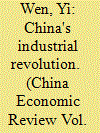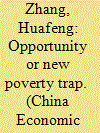| Srl | Item |
| 1 |
ID:
182811


|
|
|
|
|
| Summary/Abstract |
In “The Industrial Structure of Production: An Outline of a Research Program,” Ronald Coase and Ning Wang (2001) made a plea for a new economic research program that can go beyond the Arrow-Debreu framework and explain China's miraculous rise. They point out that the greatest trouble with the Arrow-Debreu framework lies in its inability to explain production. In this article I will push this insight further to shed new light on why and how production, or mass production in particular, emerged and mushroomed in the 18th–19th century England, the 19th–20th century United States, and 20th-21st century China but not in other parts of the world with similar geo-developmental conditions such as the Netherlands, Mexico, or India. My central thesis is that production or firms emerge in response to market demand, yet the so-called “market” is itself a fundamental public good that must be created by a development state instead of the “invisible hand.” Therefore, the lack of industrialization in any nation seems on the surface due to the lack of mass supply, but is in fact due to the lack of a mass market, which in turn is due to the lack of powerful and strong-willed market creators.
|
|
|
|
|
|
|
|
|
|
|
|
|
|
|
|
| 2 |
ID:
159050


|
|
|
|
|
| Summary/Abstract |
Despite its rapid economic growth, China has never managed to reduce its rural-urban divide with its reforms and marketization of the economy. The huge gap between urban and rural education is embedded in the disparity in educational investment, children's educational attainment, school quality and the returns to education. Migrant children move with their parents to urban cities to pursue a better education. However, the Chinese household registration system (hukou system) limits migrant children's rights and access to basic education in the cities. Will migrant children benefit from a better-quality education in the cities, or will they continue to be constrained by their hukou registration? Will the large-scale internal rural-urban migration provide the opportunity to reduce rural-urban education inequality in China, or will it merely create a new education-poverty trap? Based on publicly available large-scale survey data (RUMiC), this paper applies logistic regression and survival analysis to illustrate the new education-poverty trap imposed on migrant children by the institutional constraints and hierarchies in children's education, created by the Chinese household registration system in Chinese cities.
|
|
|
|
|
|
|
|
|
|
|
|
|
|
|
|